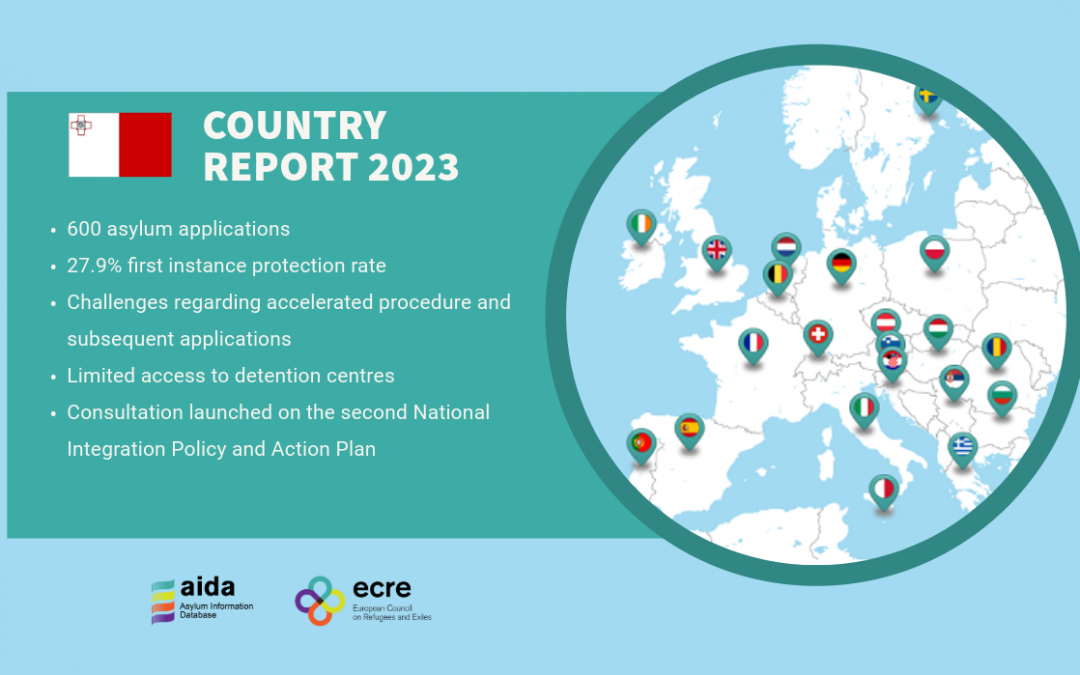The updated AIDA Country Report on Malta provides a detailed overview of legislative and practice-related developments in asylum procedures, reception conditions, detention of asylum seekers and content of international protection in 2023. It also includes an annex which provides an overview of temporary protection (TP).
In 2023, Malta received 600 asylum applications, with 833 cases pending at end of the year. The top five countries of origin for applicants were Syria, Bangladesh, Sudan, Libya and Ukraine. Of these, only Syrian nationals enjoyed a high protection rate (84.6% positive decisions at first instance). A total of 951 decisions were taken at first instance, of 488 were made without a personal interview. The overall protection rate at first instance was 27.9%. At the appeal stage, the International Protection Appeals Tribunal made 595 decisions which resulted in refugee status being recognised in just four cases and subsidiary protection being granted in five others. Of the 595 International Protection Appeals Tribunal decisions in 2023, 587 cases were made without an oral hearing.
Despite a 2022 European Court of Human Rights judgment which criticised Malta’s accelerated asylum procedure, it remained unchanged in 2023. Legal practitioners continued to argue that it violated the obligation to provide an effective remedy for all negative decisions. In 2023, 191 cases were processed under the accelerated procedure. They resulted in just two applicants being granted refugee status, one being granted subsidiary protection and 188 having their applications rejected. A new policy also barred people who filed subsequent applications which were deemed inadmissible from accessing employment. This measure was criticised by NGOs who argued that it discouraged asylum seekers from filing subsequent claims and, thus, limited their access to legal remedies.
Despite the relatively low number of arrivals in Malta in 2023, living conditions in the open reception centres remained challenging. The largest reception centre, which also houses unaccompanied children, consists of rows of metal containers with shared facilities. In addition, all third country nationals who arrived by sea in 2023, including children and vulnerable people, continued to be systematically detained on public health grounds upon arrival.
Malta formalised its approach to detention in 2023 by establishing the Detention Services Agency within the Ministry of Home Affairs. However, access to detention centres and detained asylum seekers remained a significant challenge throughout the year. Key organisations, including the United Nations Refugee Agency (UNHCR) and the International Organization for Migration, rejected the new visitors policy on the grounds that it created unreasonable barriers to providing services and prevented detained asylum seekers from receiving independent information about their cases. Although the revised visitors policy was eventually accepted (and NGOs and other stakeholders resumed visits in 2024) concerns remained that people in detention continued to be denied adequate access to information and legal advice. Living conditions in detention centres, particularly for children and vulnerable people, remained extremely poor.
In 2023, Malta’s Human Rights Directorate launched a national consultation on the country’s second National Integration Policy and Action Plan. A public consultation document was published which included key principles for the upcoming strategy and questions to guide public input. This move was seen as an opportunity to address long-standing integration challenges for asylum seekers and migrants in Malta.
The full report is available here and the annex on temporary protection is available here.
For more information about the AIDA database or to read other AIDA reports, please visit the AIDA website.

